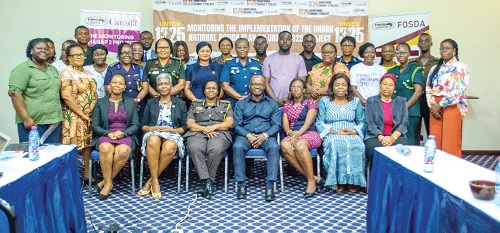Stakeholders at a validation meeting on a Ghana National Action Plan (GHANAP Two) monitoring report on the United Nations Security Council Resolution (UNSCR) 1325, on women, peace, and security, have called for the addition of emergency security threats, which also capture health emergencies as a pillar in the monitoring exercise.
They also said aside from the sectors of education, agriculture and migration, there was the need to add environmental assessment in the monitoring exercise.
The validation meeting is part of the Foundation for Security and Development in Africa’s (FOSDA) "Monitoring GHANAP Two Project," supported by Global Affairs Canada. The project assesses the implementation of Ghana’s Second National Action Plan (GHANAP Two) on UNSCR 1325, with a focus on enhancing women's participation in peace and security.
The project aims to ensure significant implementation of the current action plan on UNSCR 1325 by all key stakeholders in Ghana, achieving target results that ultimately improve women's participation in the peace and security sector.
The stakeholders included officers from the Ministry of the Interior, Ghana Police Service (GPS), Ghana Immigration Service, Ghana Revenue Authority, Customs Division, Ghana Prisons Service, Ghana National Fire Service, National Peace Council, Ghana Armed Forces, ministry of Defence, Finance, Foreign Affairs and Regional Integration and Local governance and rural development and the Institute of Local Governance Studies among other civil society organisations.
UNSCR 1325
Ghana as a member state of the United Nations adopted UNCSR 1325 and developed a Ghana-specific National Action Plan (NAP) known as GHANAP 1325 (2012 to 2015), for the implementation of the Resolution, as a response to International and Regional Treaties, Conventions, Protocols, Policies and Legal Frameworks that the country has acceded to and ratified.
The meeting, which served as a platform for stakeholders to conduct an in-depth validation of the phase two monitoring report on the independent assessment of GHANAP Two, called for the issue of migration to also be considered in GHANAP Three, among others.
A Senior Liaison Officer, High Commission of Canada, Bertha Desmennu, in an address, commended the country for its significant achievements in advancing the meaningful participation of women in peace and security, including through a partnership with Canada under the Elsie Initiative for Women in Peace Operations.
She said that the country’s commitment to the implementation of UNSCR 1325, through the development of its National Action Plans, sets a strong example for others to follow, saying the country’s efforts to integrate women into peace and security processes have shown tangible progress.
A Deputy Director, Department of Gender under the Ministry of Gender, Children and Social Protection, Sabiah Kpekata, said GHANAP Two provides a framework of a well-coordinated approach where different stakeholders pool their efforts together to implement the NAP in a more organised way for easy monitoring.
She gave an assurance that the ministry was reviewing GHANAP Two this year, so it will come out with the third edition of the plan.
In a welcome address, the Executive Director of FOSDA, Theodora Williams-Anti, said GHANAP Two sought to address the challenges of GHANAP One and prioritise specific areas of action for implementation.
She said GHANAP One was not fully implemented because it was flawed.
The unavailability of an inter-ministerial steering committee to coordinate the implementation in a concerted manner, the lack of a dedicated budget for implementation, and the lack of coordination between different stakeholders made the implementation somewhat haphazard and difficult to monitor.
Writer’s email:rebecca.quaicoe-duho@graphic.com.gh

